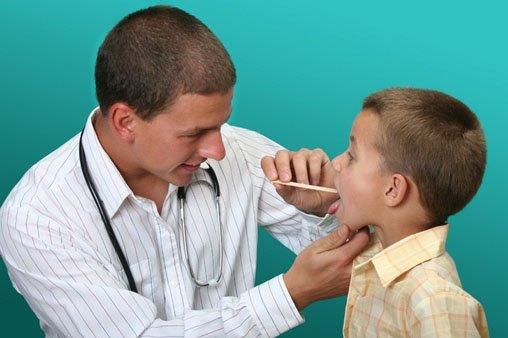Medical expert of the article
New publications
Pain when swallowing
Last reviewed: 04.07.2025

All iLive content is medically reviewed or fact checked to ensure as much factual accuracy as possible.
We have strict sourcing guidelines and only link to reputable media sites, academic research institutions and, whenever possible, medically peer reviewed studies. Note that the numbers in parentheses ([1], [2], etc.) are clickable links to these studies.
If you feel that any of our content is inaccurate, out-of-date, or otherwise questionable, please select it and press Ctrl + Enter.

Doctors call pain in the throat when swallowing odynophagia. It can be caused by various diseases: problems with the digestive system, as well as bacterial or viral infections that cause flu or colds. Dry air can also be the cause of pain when swallowing. Let's look at these causes and symptoms in more detail.

What causes pain when swallowing?
Esophagitis
The causes of this disease are pathogenic microorganisms, in particular, Candida or the herpes simplex virus. If a person has a weakened immune system, he or she has a higher risk of contracting herpes.
Symptoms include sore throat, pain when swallowing, abdominal pain and pain in the esophagus. If acute esophagitis is severe, a person vomits, the body temperature rises, the person shivering, and blood tests show an increased level of leukocytes. Typical herpetic rashes appear on the lips and under the nose, as well as on it, and this is an additional characteristic sign for diagnosis.
In addition to pain when swallowing, esophagitis is accompanied by severe fatigue and, in severe cases, bleeding from the esophagus due to rupture of the thin walls of the esophagus.
To diagnose an infectious lesion of the esophagus, it is necessary to conduct an X-ray examination, as well as tests for microflora (bacterial culture). When the causative agent of esophagitis is found, it is much easier to choose a treatment. It may include clotrimazole or nystatin, as well as ketoconazole (it is used for reduced immunity). If a person suffers from immunodeficiency syndrome, fluconazole is used.
A person does not suffer from esophagitis so often if he regularly takes immunostimulants. Strong immunity suppresses the formation of pathogenic microflora. Therefore, you need to take care of the strength of your immunity so as not to get sick.
Allergy
If a person suffers from an allergy, he or she may experience pain when swallowing. Allergies can occur to any food, such as citrus fruits, pollen, poplar fluff, and animal hair. Symptoms of an allergy include a red face, sneezing or difficulty breathing, a runny nose (that doesn't go away), and pain when swallowing.
 [ 8 ], [ 9 ], [ 10 ], [ 11 ], [ 12 ]
[ 8 ], [ 9 ], [ 10 ], [ 11 ], [ 12 ]
Reaction to dry indoor air
Pain when swallowing can occur in a room where the air is too dry. These are offices or a house where air conditioners or fans are constantly on. Pain when swallowing can also occur in ecologically unfavorable areas.
Smoking
Pain when swallowing can often be caused by tobacco smoke, especially in passive smokers. The upper respiratory tract and throat mucosa become irritated, causing pain.
Muscle strain
This factor can also be the cause of pain when swallowing. The throat muscles are the same as those throughout the body, they can also tense up and hurt. Therefore, pain can occur in them. For example, after a person has spoken or sung a lot and for a long time. This disease most often affects artists and teachers.
Gastroesophageal reflux, or heartburn
In this disease, bile from the stomach is thrown back into the esophagus. Since this liquid contains caustic hydrochloric acid, a person begins to suffer from heartburn - discomfort in the throat and chest, as well as pain when swallowing. The mucous membrane of the throat can be excessively irritated, and this causes additional pain. Heartburn occurs due to an overly relaxed sphincter, as well as if its contractions are impaired. In this case, a person does not suffer from either a bacterial or viral infection.
HIV (AIDS)
People with a very weakened immune system, as is the case with AIDS, often experience pain when swallowing, which becomes chronic. This happens because bacteria and viruses easily penetrate the body when the immune system is not working. Manifestations of such an attack are candidal stomatitis or cytomegalovirus infection. These conditions can be life-threatening for a person who needs to call an ambulance immediately.
Malignant and benign tumors
These tumors can affect the tongue, throat, ligaments and any part of the esophagus. This causes pain when swallowing. Alcoholics and smokers are at risk. The tumor does not develop rapidly - at least a year is needed for it to develop. Therefore, a person needs a preventive examination every year to know the real state of their body and start treatment in time.
What increases the risk of painful swallowing?
Age-related features
Pain when swallowing is most disturbing for teenagers and children. This is because the mucous membrane of their throat is too vulnerable to irritation and infections, especially streptococci. The riskiest age is from 5 to 17 years. At this age, pain when swallowing can occur up to 5 times during the school year. In adults, the risk of developing this ailment decreases. It can bother a person 2.5 times less often.
 [ 13 ], [ 14 ], [ 15 ], [ 16 ], [ 17 ], [ 18 ]
[ 13 ], [ 14 ], [ 15 ], [ 16 ], [ 17 ], [ 18 ]
Love for oral sex
Oral sex increases the risk of developing pain when swallowing. Gonococcal angina can affect the mucous membrane of the throat if the partner has infected the partner with gonococci during oral sex. Since a person is not protected during oral sex, infections that cause syphilis, gonorrhea, herpes, and HIV can penetrate through the throat.
Frequent throat and sinus problems

This could be sinusitis, various types of tonsillitis, throat irritation. And the culprit is infections that enter the body through airborne droplets or contact with a sick person.
Working in a cramped office
If a person works in conditions of high density of people, it is very easy and simple to get infected with some viral or bacterial disease. Kindergartens, schools, colleges, institutes, factories, bus stops, minibuses and trains - all these are places where it is very easy to get infected with any infection. Why does pain occur when swallowing, because the infection, as a rule, affects the respiratory tract.
Dislike of hand washing
This can be a significant cause of infection with pathogenic (disease-causing) bacteria. If a person often washes his hands with soap, often changes handkerchiefs and once every three months - a toothbrush, he significantly reduces the risk of infection with infectious diseases that lead to colds and gastrointestinal tract problems. And at the same time, pain when swallowing due to these diseases can be avoided.
If the pain when swallowing bothers you for more than three days and becomes acute, you must call a doctor so as not to miss the progression and development of a serious disease.
Symptoms of pain when swallowing
Pain when swallowing rarely occurs on its own. Most often, it is accompanied by other symptoms. They can be used to determine what disease is currently causing pain when swallowing.
Symptoms of a cold
- Severe runny nose
- Lacrimation, photophobia
- Cough, often dry and then wet
- Pain when swallowing
- Pain throughout the body, aches
- Headache, severe or mild
- High temperature – up to 38.5.
Symptoms of flu
- Pain when swallowing
- Sore throat
- A strong increase in temperature – above 39 degrees
- Muscle pain throughout the body
- Increased skin sensitivity
- Weakness and fatigue
- Chills
- Excessive sweating
- Headache - usually severe
Symptoms of infectious mononucleosis
- Severe pain in the throat when swallowing
- Enlarged lymph nodes in the neck or armpit area
- Enlarged tonsils
- Severe headache
- Temperature increase
- Skin rash
- Weak or no appetite
- Soft liver or spleen and pain in their area
- Inflamed liver tissue

